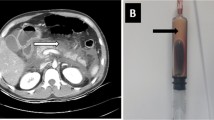Summary.
Severe hyperchylomicronemia due to defects of lipoproteinlipase or apoC-II is a rare cause for acute pancreatitis. Food with a high content of fat, as well as alcoholic or hormonal influences, can lead to excessive hypertriglyceridemia. Especially hyperchylomicronemia due to hormonal influences during pregnancy are troublesome. Here, we are confronted with both the risk to the mother as well as the vital risk to the unborn. Conventional plasma apheresis has been used to successfully eliminate chylomicrons and, thus, the primary cause of chylomicron-induced pancreatitis. Most recently, we reported the use of selective LDL-apheresis in a 24-year-old pregnant woman (thirteenth week of pregnancy), who was admitted with the signs of acute pancreatitis to our hospital. The patient was known to have a history of severe hyperchylomicronemia and she had also been treated several years before for acute pancreatitis by LDL-apheresis. Her triglycerides were severely elevated (11500 mg/dl) and, in order to achieve a rapid decrease of chylomicrons, we decided to treat her by selective LDL-apheresis utilizing HELP-apheresis.
The treatment was well tolerated and within half an hour the patient was free of any abdominal pain. However, due to the enormous triglyceride load, we needed to change the precipitat filters several times and at the end of the treatment triglyceride levels were 6600 mg/dl. Under a low-fat diet (<30 gram fat per day), the follow-up was uneventful and the patient delivered a healthy baby at the end of week 39. We conclude that LDL-apheresis is a safe and rapid procedure to eliminate chylomicrons in chylomicron-induced pancreatitis.
Zusammenfassung.
Eine schwere Hyperchylomikronämie kann in seltenen Fällen Auslöser für eine akute Pankreatitis sein. Häufig ursächlich sind Defekte der Lipoproteinlipase oder ein Mangel an ApoC-II, dem Kofaktor der Lipoproteinlipase. Bei entsprechender genetischer Disposition können bereits geringfügige Diätfehler (z. B. Alkohol, fetthaltige Ernährung) oder bei jungen Frauen hormonelle Einflüsse (z. B. hormonelle Kontrazeption oder Schwangerschaft), zum Auftreten einer akuten Pankreatitis führen. Da es sich bei der akuten Pankreatitis um eine potenziell tödliche Erkrankung handelt, müssen sämtliche Therapieoptionen genutzt werden, den Verlauf günstig zu beeinflussen.
Die hyperchylomikronämieinduzierte Pankreatitis stellt dabei auch hinsichtlich apparativer Therapieverfahren (konventionelle Plasma-Apherese, selektive Lipid-Apherese) eine besondere Herausforderung dar.
Wir berichten über eine 24-jährige Schwangere mit drohendem Abort. Der Verdacht einer akuten Pankreatitis konnte rasch bestätigt werden. Eine Hyperchylomikronämie, die früher bereits unter hormoneller Kontrazeption zur Pankreatitis geführt hatte und mittels LDL-Apherese behandelt wurde, war vorbekannt. Jetzt waren die Triglyzerid-Spiegel mit 11 500 mg/dl massiv erhöht. Es erfolgte eine selektive Lipid-Apherese mittels HELP-Technik. Die technisch schwierige Behandlung (mehrfach erforderlicher Wechsel des Präzipitatfilters) wurde gut toleriert. Bereits nach 30 min wurde die Patientin schmerzfrei. Die Triglyzeride konnten initial auf 6600 mg/dl gesenkt werden. Unter streng fettarmer Diät war der weitere Verlauf stabil, die Schwangerschaft endete mit der spontanen Geburt eines gesunden Kindes in der 39. Schwangerschaftswoche.
Similar content being viewed by others
Author information
Authors and Affiliations
Corresponding author
Rights and permissions
About this article
Cite this article
Sattler, A.M., Bock, K., Schmidt, S. et al. LDL-Apherese bei der hyperchylomikronämieinduzierten Pankreatitis. Z Kardiol 92 (Suppl 3), iii64–iii67 (2003). https://doi.org/10.1007/s00392-003-1311-y
Issue Date:
DOI: https://doi.org/10.1007/s00392-003-1311-y




